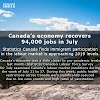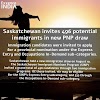While acquiring a Canadian permit or visa is an objective for endless outside nationals around the globe, the status it presents may should be expanded. This could raise a large group of issues that the outside national might not have looked in their initial application.
Increasing an extension may prove much more complicated than expected given the most recent travel bans, outskirt terminations, and limitations executed in light of coronavirus (COVID-19)
Increasing an extension may prove much more complicated than expected given the most recent travel bans, outskirt terminations, and limitations executed in light of coronavirus (COVID-19)
 |
| exxence india |
Study permit renewal
So as to reestablish their examination grant, students must clarify why another approval is required to proceed with their investigations in Canada. This can be hard to do if the individual has not generally been a full-time student or on the off chance that they wish to change projects or schools. The augmentation must fit into the student's scholarly arrangement and at last be steady with the students vocation yearnings.
Work permit renewal
Work permit expansions are commonly the most hazardous as they require a Work Market Effect Appraisal (LMIA). Numerous businesses and outside nationals accept that this procedure must be finished just a single time, as a pre-imperative to the underlying work license application.
Be that as it may, the impact of the remote national on the Canadian work power must be rethought while applying for an augmentation. For uncommon work allows that don't require a LMIA, or that accommodate an encouraged LMIA, confirmation of the laborer's qualification must be given in a similar way as the underlying application.
Visitor visa renewal
Compared with students and workers, visitors have the least amount of time to apply for extensions since they are generally granted a stay in Canada for a maximum of six months at a time.
The explanation behind needing to delay their stay in Canada must be unmistakably shown when a guest is presenting an expansion demand. The central government is careful about individuals attempting to live in Canada forever on a transitory visa. The onus is on the candidate to legitimize the augmentation and exhibit that they will surely get back toward the finish of their stay in Canada.
Implied Status
Regardless of the status in question, the concept of implied status can play an important role with respect to the extension of a stay in Canada.
Inferred status alludes to circumstances where an application to expand status is submitted while the remote national's grant or visa is as yet legitimate. In such cases, the remote national may stay in Canada past the expiry date of their status until a choice is made on their application for augmentation.
During this period, the conditions to which their status was subject, and the benefits it presented on them, are broadened even past the expiry date. This implies a laborer can keep on working, an student can proceed to study, and a guest is essentially permitted to stay in Canada as a guest.
There is a significant proviso to this standard and it applies to the outside nationals who leave and return Canada while they are on suggested status. On the off chance that a remote national does as such, paying little mind to the explanation behind flight, inferred status is commonly lost and the caution to permit the outside national to reemerge the nation lies with the migration official at the fringe.
Expect processing delays during coronavirus
Despite the fact that the IRCC rules prescribe that you apply for an augmentation of your brief remain 30 days before your status terminates, it's anything but an obligatory principle. Notwithstanding, in view of the numerous inquiries that may emerge as for broadening status in Canada, candidates hoping to expand their status should start taking a shot at their augmentation when they know they will look for an expansion.
This is particularly important with the emergence of COVID-19 as it is uncertain how visa processing will be impacted by this unexpected pandemic and it is wise to begin extension preparations as soon as possible to take into account potential delays.
Extension of temporary stay through “flagpoling” – now impossible for some applicants due to coronavirus
As for how a solicitation for an augmentation is made, an individual in Canada can by and large either apply on the web or go to the Canadian outskirt to apply at the port of entry.
The last procedure is regularly alluded to as "flagpoling". It includes the remote national essentially entering the US and afterward quickly coming back to Canada to present the expansion solicitation to Canadian fringe authorities.
This is commonly the quickest method to have an augmentation affirmed in such a case that the expansion is in truth, the new visa or permit is issued promptly and the remote national comes back to Canada with their all-encompassing status.
While it is the quickest augmentation choice, it isn't accessible to every single remote national in Canada. For instance, remote nationals from nations that require an impermanent inhabitant visa (TRV) and who are hoping to broaden their guest status, or change their status from guest to laborer, can't flagpole.
So also, remote nationals of any nation looking to expand their examination grant can't do as such by flagpoling as just U.S. residents are permitted to apply for an investigation grant at the Canadian port of entry.
At last, since flagpoling includes entry into the US, any foreigner not approved to enter the US can't utilize this procedure to expand their status.
Because of the development of the coronavirus, the Canadian government has shut the outskirts to any individual who is certainly not a Canadian resident or perpetual occupant, which implies that the rundown of individuals who can't flagpole has been fundamentally extended.















1 Comments
Thanks for the useful post, anyone wants to go Canada from India Visit the top immigration consultants in delhi for canada - novusimmigrationdelhi
ReplyDelete